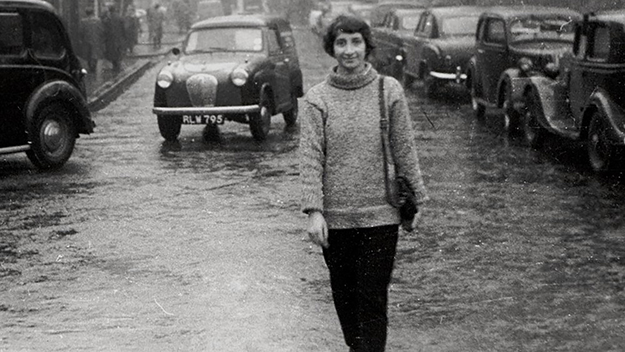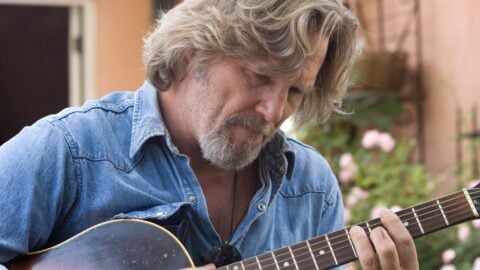“I Am a Genius!”
This article appeared in the January 19, 2024 edition of The Film Comment Letter, our free weekly newsletter featuring original film criticism and writing. Sign up for the Letter here.

Lorenza Mazzetti. Image courtesy of BFI National Archive
I first encountered the pioneering work of filmmaker Lorenza Mazzetti in 2008, when I moved to London from Portugal. To familiarize myself with British cinema, I decided to watch the great New Wave directors, such as Karel Reisz and Lindsay Anderson, who, along with Tony Richardson and Lorenza Mazzetti, had co-founded the Free Cinema movement in the mid-1950s. Pairing shoestring budgets with a fearlessly experimental approach, Free Cinema filmmakers rejected the moral and logistical conventions of commercial cinema and instead focused their attention on the complex social world of postwar England, primarily through the documentary form.
Mazzetti’s early films K (1953) and Together (1956) are unique, even within the Free Cinema movement, in how they combine neorealism with the absurdism and satire that would later become predominant in British cinema. K, a 28-minute adaptation of Franz Kafka’s Metamorphosis, is one of the first film treatments of the author’s texts. As I learned more about Mazzetti’s life and reflected on her position as an immigrant working in a foreign culture (she had moved to England from Italy in the 1950s), I began to think of K as a cinematic example of “deterritorialized language,” which is how philosophers Gilles Deleuze and Félix Guattari describe Kafka’s writing. Her remarkable life was marked by this sense of alienation, which is key to any appreciation of her artistic achievements.
When Mazzetti appeared on London’s art scene in the early 1950s, she left behind the distressing childhood portrayed in her 1961 autobiographical novel, The Sky is Falling (republished by Another Gaze in 2022, in a translation by Livia Franchini). After her mother died of complications from childbirth in Florence in 1927, she and her twin sister, Paola, were taken in by their aunt Nina and uncle Robert, a cousin of Albert Einstein. In 1944, as the Allied forces were advancing, officers from the Wehrmacht entered their Tuscan farmhouse looking for Robert, who managed to escape. On his return, he discovered that the Nazis had murdered his wife and children. He killed himself the following year. Against all odds, Mazzetti and her sister survived the war, in the care of a custodian designated by their uncle.
Lorenza Mazzetti arrived in England as a young woman through a program run by the University of Florence, where students were sent to work on farms abroad. However, she soon moved to London and flitted among various homes and precarious jobs while trying to find her footing. In her 2014 book London Diaries, she describes the horrifying episodes of abuse and sexual harassment that she suffered in the streets during this period. Her life changed when she enrolled in the Slade School of Fine Art to pursue her interest in painting. She writes that she turned up at the school one day and insisted she be admitted. The director, William Coldstream, pointed out that the institution did not grant admission on demand. Mazzetti blurted out: “I am a genius!” She began classes the following day.
The Slade was her gateway to the world of filmmaking. She shot K with equipment stolen from the school. Upon learning about this petty crime—and the exacerbating fact that she had charged all the lab costs to the Slade—Coldstream (whom she would later describe as her “angel”) offered her a deal: he would screen K on campus, and if the student audience approved of the film, Mazzetti could avoid expulsion and criminal charges. With its nightmarish tone, forging an expressionist dialogue between protagonist Gregor Samsa’s interior landscape and the urban setting of London, K caused a tremendous sensation at the Slade. In the audience was Denis Forman, director of the British Film Institute and founder of the Experimental Film Fund, which later financed various Free Cinema productions.
Free Cinema was launched in 1956 with a manifesto by Anderson, Mazzetti, Reisz, and Richardson that defined the movement as an “attitude” and a “style,” driven by “a belief in freedom, in the importance of people and the significance of the everyday.” The first Free Cinema program was screened at the National Film Theatre in February of that year, and five more such screenings followed through 1959. The films shown—like Reisz and Richardson’s Momma Don’t Allow (1956), Anderson’s Every Day Except Christmas (1957), and Robert Vas’s Refuge England (1959)—left an indelible mark on British cinema and beyond. Foreign nationals studying and working in film in the U.K., like Portuguese director Fernando Lopes, would bring this socially focused approach back to their countries.
Mazzetti and Denis Horne’s Together premiered as part of the inaugural Free Cinema program. It tells the story of two young deaf-mute dock workers (played by artists Eduardo Paolozzi and Michael Andrews) who wander through the postwar streets and pubs of East London, trailed, like the Pied Piper of Hamelin, by an army of children. The film portrays the mutual affection and separation of the two main characters, before building into a brutal allegory about the plight of the marginalized and displaced.
Until recently, K and Together were the only early films by Mazzetti that were known to have survived. During an interview conducted by Henry K. Miller for Brighid Lowe’s documentary, Together with Lorenza Mazzetti (2023), Mazzetti (who died in 2020) disclosed the whereabouts of a long-lost film she had directed at the Slade, The Country Doctor (1953). “I gave it to a producer, a friend of Jonas Mekas…,” she said. Miller promptly asked whether she was referring to Amos Vogel. To everyone’s astonishment, Mazzetti replied, “Amos—Amos, yes, him!” The film was located in the Amos Vogel Archive at the University of Wisconsin-Madison, and the BFI released a restored version late last year. The Country Doctor adapts yet another text by Kafka, depicting a doctor’s nightmarish horseback ride to visit a patient. Presented in a nonlinear fashion, through suffocatingly tight close-ups, his journey ends with a disturbing bedside scene: the doctor and his patient discuss the nature of the latter’s wounds, which emerge as a metaphor for the duo’s existential maladies.
Watching The Country Doctor led me to a further discovery. In 2012, I co-programmed Jake Auerbach’s documentary Paula Rego: Telling Tales (2009) at the Barbican Centre in London. Before the screening, I talked with Rego about her early years in London, just after she’d left Portugal. She told me that her late husband, the painter Victor Willing, had appeared in several films while studying at the Slade. For years, I tried in vain to locate any references to his on-screen appearances. Then, last year, I saw him in The Country Doctor in the role of the protagonist!
Last year marked a turning point in the visibility of Mazzetti’s work: Lowe and Miller unearthed another film of hers, Un anno di più (1960), more than six decades after its original broadcast on the Italian public television channel, RAI. The film is a moving composition of ethnographic interviews, anticipating Jean Rouch and Edgar Morin’s Chronicle of a Summer (1961), with children from various backgrounds on the streets of Rome. It immediately prefigures Mazzetti’s investigation into the inner worlds of children in I bambini, o: l’educazione sessuale dei figli (The Kids, Or: Children’s Sexual Education), her contribution to the anthology film Latin Lovers (1961). In that episode, a group of children talk about issues such as birth, sexuality, and gender, offering a sharp and poetically nonbinary inquiry into the role of language in the socialization of gender norms. The omnibus was intended to address issues that affected women in Italy at the time, but Mazzetti was the only female director to be included.
Though Mazzetti didn’t make any more films after completing Mysteries of Rome in 1963, she found success as a writer, novelist, and puppet-theater director. The newly discovered projects offer a more complete portrait of a maverick artist who fought against oppressive normativity, and whose work continues to inspire and, as author Ali Smith remarked about Mazzetti’s writing, to teach us “how to retain . . . innocence even at the core of a smashed-up adult psyche.”
Guilherme Blanc is artistic director at Batalha Centro de Cinema, where he curated the retrospective Lorenza Mazzetti: Against All Odds in 2023. He teaches film at Universidade Católica Portuguesa’s Escola das Artes.







